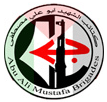Abu Ali Mustapha Brigades
| Abu Ali Mustapha Brigades كتائب ابو علي مصطفى Katāʾib Abū ʿAlī Muṣṭafā | |
|---|---|
 | |
| Leader(s) | Ahmad Sa'adat |
| Dates of operation | 1967-present |
| Active region(s) | Israel, Gaza Strip, West Bank, Western Europe |
| Ideology |
Palestinian nationalism Marxism–Leninism Guevarism Secularism Revolutionary socialism Anti-Zionism[1][2][3] |
The Abu Ali Mustapha Brigades (Arabic: كتائب ابو علي مصطفى katāʾib abū ʿalī muṣṭafā) is the armed wing of the Popular Front for the Liberation of Palestine (PFLP) in the Palestinian territories (the West Bank, Gaza and East Jerusalem).
Originally named the Red Eagles Brigades the Brigades were renamed in 2001 after Abu Ali Mustafa, the PFLP's leader who was killed by Israel in August 2001. They have been active with attacks on both military and civilian Israeli targets during the al-Aqsa Intifada.
On the 16 July 2007, Palestinian president Mahmoud Abbas requested of all Palestinian resistance groups to relinquish their weapons to the Palestinian Authority. Although several members of Fatah's armed wing Al-Aqsa Martyrs' Brigades complied, the Abu Ali Mustafa brigades rejected this, stating that they will not cease their resistance until the Israelis unoccupy all parts of the West Bank and the Gaza Strip.
Attacks carried out by the Brigades
The PFLP's Abu Ali Mustapha Brigades has carried out attacks on both civilians and military targets during the Al-Aqsa Intifada. Some of these attacks are:
- The killing of Meir Lixenberg, councilor and head of security in four settlements, who was shot while traveling in his car in the West Bank on 27 August 2001.
- The 17 October 2001 assassination of right-wing Israeli politician and Israeli Minister for Tourism Rehavam Zeevi, the only Israeli politician to have been assassinated in the al-Aqsa intifada.
- A suicide bombing in a pizzeria in Karnei Shomron in the West Bank, on 16 February 2002, killing three Israelis.
- A suicide bombing in Ariel on 7 March 2002, which left wounded but no fatalities.
- A suicide bombing in a Netanya market in Israel, on 19 May 2002, killing three Israelis. This attack was also claimed by Hamas, but the Abu Ali Mustafa Brigades have identified the perpetrator on their website as one of their members.
- A suicide bombing in the bus station at Geha Junction in Petah Tikva on 25 December 2003 which killed 4 Israelis.[4]
- A suicide bombing in Bikat Hayerden on 22 May 2004, which left no fatalities.[5]
- A suicide bombing in the Carmel Market in Tel Aviv on 1 November 2004, which killed 3 Israelis.[6]
- The killing of four Israelis and another eight injured at a synagogue in West Jerusalem on 18 November 2014.[7]
References
- ↑ "Popular Front for the Liberation of Palestine (1)." Terrorist Group Symbols Database. Anti-Defamation League.
- ↑ "Platform of the Popular Front for the Liberation of Palestine (PFLP)" (1969). From Walter Laqueur and Barry Rubin, eds., The Israel-Arab Reader (New York: Penguin Books, 2001).
- ↑ "Background Information on Foreign Terrorist Organizations Archived February 8, 2007, at the Wayback Machine.." Office of the Coordinator for Counterterrorism, United States Department of State
- ↑ "ארבעה הרוגים בפיגוע בצומת גהה - חדשות". Ynet. Retrieved 15 December 2012.
- ↑ "מחבל פוצץ עצמו במחסום בבקעה, חייל נפצ - חדשות". Ynet. Retrieved 15 December 2012.
- ↑ "נשים וגבר נרצחו בפיגוע בשוק הכרמל בת"א - חדשות". Ynet. Retrieved 15 December 2012.
- ↑ "Palestinians kill Israeli worshippers at Jerusalem synagogue". BBC News. 18 November 2014.